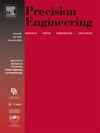A novel minimum zone method for cylindricity error evaluation based on rotation projection method and adaptive particle swarm optimisation
IF 3.5
2区 工程技术
Q2 ENGINEERING, MANUFACTURING
Precision Engineering-Journal of the International Societies for Precision Engineering and Nanotechnology
Pub Date : 2025-02-26
DOI:10.1016/j.precisioneng.2025.02.025
引用次数: 0
Abstract
To realize an accurate and rapid evaluation of cylindricity error, a novel minimum zone algorithm based on rotation projection method and adaptive particle swarm optimisation (RPM–APSO) is proposed. The principle of this method is to firstly transform the three-dimensional cylindrical coordinates into two-dimensional circular coordinates via rotation and projection, and then calculate the minimum zone roundness error that is equivalent to the minimum zone cylindricity error. APSO algorithm is adopted twice to determine the optimal rotation angles and accurate roundness error of the projected coordinates respectively. Owing to the dimensionality reduction, the calculation difficulty is reduced and the computational efficiency is substantially improved. The effectiveness and accuracy of the proposed algorithm are verified by constructing two groups of cylindrical simulation datasets. Compared with other five intelligent optimisation algorithms and the results of the published literature, the RPM–APSO algorithm is proved to be superior in terms of computational accuracy and convergence speed, which can provide an accurate, efficient and reliable method for the cylindricity error evaluation of micro-nano coordinate measuring machine.
基于旋转投影法和自适应粒子群优化的最小区域圆柱度误差评估方法
为了准确快速地评估圆柱度误差,提出了一种基于旋转投影法和自适应粒子群优化(RPM-APSO)的最小区域算法。该方法的原理是先将三维柱坐标通过旋转和投影变换为二维圆坐标,然后计算出与最小区圆柱度误差等效的最小区圆度误差。采用两次APSO算法分别确定投影坐标的最优旋转角度和精确圆度误差。由于降维,降低了计算难度,大大提高了计算效率。通过构建两组圆柱仿真数据集,验证了该算法的有效性和准确性。通过与其他5种智能优化算法及已发表文献结果的比较,证明了RPM-APSO算法在计算精度和收敛速度方面具有优越性,可为微纳坐标测量机圆柱度误差评价提供一种准确、高效、可靠的方法。
本文章由计算机程序翻译,如有差异,请以英文原文为准。
求助全文
约1分钟内获得全文
求助全文
来源期刊
CiteScore
7.40
自引率
5.60%
发文量
177
审稿时长
46 days
期刊介绍:
Precision Engineering - Journal of the International Societies for Precision Engineering and Nanotechnology is devoted to the multidisciplinary study and practice of high accuracy engineering, metrology, and manufacturing. The journal takes an integrated approach to all subjects related to research, design, manufacture, performance validation, and application of high precision machines, instruments, and components, including fundamental and applied research and development in manufacturing processes, fabrication technology, and advanced measurement science. The scope includes precision-engineered systems and supporting metrology over the full range of length scales, from atom-based nanotechnology and advanced lithographic technology to large-scale systems, including optical and radio telescopes and macrometrology.

 求助内容:
求助内容: 应助结果提醒方式:
应助结果提醒方式:


